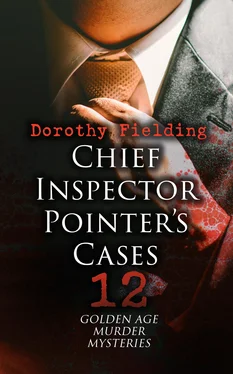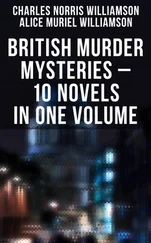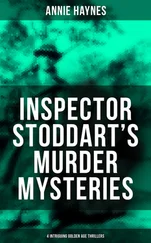The men separated, one letting himself back into the flat and the other moving softly and slowly down the stairs.
Like a shadow Christine slipped after him. Near the house door she heard a click, and Mr. Beale switched on an electric torch for a second which gave her a glimpse of his face, before he swung open the door and shut it noiselessly behind him.
Another half-hour passed and she heard M. Beauregard's door again opened. This time it closed with a bang, and firm steps echoed down the stairs—no conspirator this apparently.
The minutes dragged by, till at exactly a quarter to twelve the front door was again unlocked, someone with an electric torch was coming up. A tall man, well muffled up, for the night was fresh. Christine slipped down to the door of the third floor flat, but keeping out of the ray of his steady light. The stranger come on, evidently making for the same goal. He got to the mat and extended his hands towards the little push button.
"Ne sonnez pas, monsieur, ne sonnez pas!" she murmured, touching his right arm.
"Hein?" He wheeled to face her, at the same moment the door was flung open and a clerk stood there bowing courteously.
"Come in, monsieur and madame. We did not expect a lady, but pray come in. I am M. Beauregard's head clerk."
M. Meunier entered briskly. For a second Christine hesitated. But what might be the effect of calling in the police? She stepped in, too. The door shut.
"This way"—and the clerk bowed them into a cheery office. "I go for the other witness."
Christine had exhausted her stock of French. She whispered hurriedly in English.
"M. Meunier, I am Christine West. There is something wrong. That man has confederates and a Mr. Beale is in it, too. After the signing—"
He gave her a reassuring glance.
"We, too, are prepared. The password, mademoiselle?"
"Suneverup. And yours?"
"Piratekeep."
The silly names from out her childhood seemed doubly incongruous just then, but as she looked him over, she guessed that M. Meunier would be a good man in a scrap. Tall, resolute, grey at the temples, and a bit red in the face, but with an eye like a boy's, and every short hair on his head bristling with vitality. Without a word he fastened his electric torch to the wall over by the door. She followed his example, hanging hers where he silently pointed beside a second door. She lit a candle which stood ready with matches and sealing wax on a desk in the middle of the room.
The head clerk entered, with a big stout German-looking man.
"M. Kaufmann, who will witness the signatures with me." The head clerk looked in surprise at the extra lights.
"It is said that there may be a strike of the electricians quite suddenly tonight," said M. Meunier shortly.
"Tiens!" muttered the head clerk, who did not seem to find the arrangements particularly welcome.
M. Meunier drew out two long papers from an inner pocket.
"We will sign now, mademoiselle, if you are ready. These are duplicates of one another. I shall keep the one, and the other will in due course reach our friend. I will sign first, and then if you will write your name here in this blank and then here"—he pointed out two blanks—"these gentleman will witness them both."
Christine watched his firm signature flourish. "Charles Bonnot"—the name of a member of the famous Lyons Silk house.
Then he handed her a pen and drew out a chair for her.
"Do not be nervous, mademoiselle," and his hand pressed her shoulder for a second to reinforce his meaning.
Christine felt her heart beating violently. It was all very well for him to reassure her, but they were but two against unknown odds.
She signed, and made way for the head clerk, who stood waiting for his turn, with one hand pressed on his waistcoat, and with a face now red, now white.
He, too, signed twice, and then moved away to the other side of the room. The burly M. Kaufmann bent over the table. Christine stared down at the first neat signature.
"You can go now, Kaufmann." The head clerk nodded to the door of an inner room on which his eyes had been riveted.
" Bon!" said the stout man obediently, "bonsoir madame, bonsoir monsieur." He held out his hand to the chief clerk, who snatched at it automatically.
There was a click, an oath from the head clerk, who stood twisting his wrists with handcuffs on them.
"Don't be alarmed, Miss West. It's me, Chief Inspector Pointer. I saw you read my name. M. Meunier and I thought we would let this gang hang themselves. As for the chaps he's shouting for, they're safely under lock and key in one of the cupboards, out of sight and sound. I can't have them taken away yet because of our friend, Mr. Beale. He's such a suspicious customer, and it's especially him I'm after." He turned to the clerk.
"Now look here." Pointer spoke excellent French—a war benefit. "If you want a lighter sentence assist the law now."
The man was utterly cowed. He burst into a flood of protests, excuses, and accusations of Beale, whose money had corrupted an honest man.
"Now look here," Pointer said again. "When Mr. Beale comes, open the door to him exactly as if nothing had happened. Close and bolt it behind him, and leave the rest to us. If you do this M. Meunier may put in a word for you to the police."
M. Meunier, who evidently believed in not interfering with another man's job, now nodded assent.
The clerk tremblingly assured them that he would do his very best.
M. Meunier again nodded. "It will be a question of twenty years for you if you do not," he threw in.
The Chief Inspector went on to amplify his instructions.
"When Mr. Beale comes, show him in as I said. This room will be empty. I want him to talk before witnesses. Say that both messieurs—Mr. Beale need not know anything about this lady till afterwards—are tied up and are being guarded by the other men. Ask him for payment before you let him have the papers. Be sure and tell him explicitly that these are the papers taken by force from M. Meunier. You are a lawyer's clerk and understand what is wanted. We wish Mr. Beale to incriminate himself hopelessly before witnesses. We shall be listening with the door ajar. I shall open it wider when you are to hand the papers to the American. You understand?"
The frightened man said that he did and would do his best.
"It may make all the difference in your life how good your best is," M. Meunier warned him grimly.
Christine took an impulsive step forward.
"Oh, Mr. Pointer, what have you found out? Will it free John? Will it free him?"
"As to freeing him, that depends on himself, as you know, Miss West. If a man won't speak, won't give an alibi—"
"Ah, but he will now," put in M. Meunier; "the brave Carter! He can speak now. He signaled to me by means of the half-drawn curtain when he was arrested that he would say nothing till I gave the word. It was part of our contract, and vitally necessary, but the time for silence will have passed once these papers are in safe keeping, as they will be before morning. See, here is 'Yes'"—he handed her a slip of paper from his pocket-book—"that means just that to our friend—'Yes, you can speak. Yes, a great, an immense fortune is yours. Yes, all is well, and if we get M. Beale—'"
"Hush!"
A light ring sounded at the door.
Pointer glanced at his watch.
"That's him. Now, then, Daru, see that you play your part well."
The man nodded eagerly. The three took their places Inside the room which opened out of the one they had been in.
"But why aren't they in here? And the papers—the papers, where are they? Quick!"
"I have them," the head clerk answered calmly. He was acting most convincingly. "I have the papers, monsieur, but I think we should have a little further understanding before I hand them over. I think you should raise the price you promised if all went well. All has gone well. What do you suggest?"
Читать дальше












